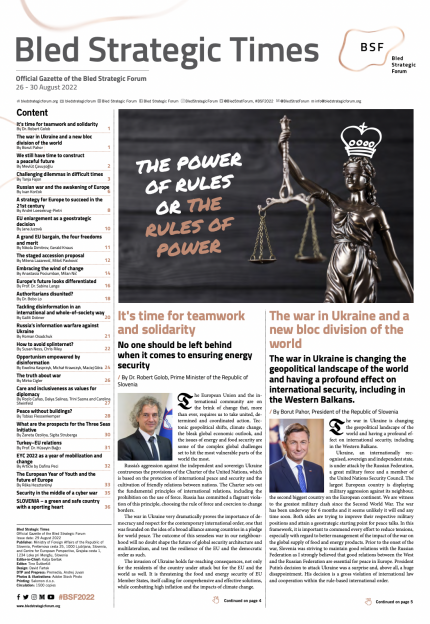This text was written in the context of the Bled strategic forum. The entire PDF can be dowloaded here.
"Now listen to my heart / It says Ukraine, waiting for the wind to change” – this is how the Scorpions adapted their famous song while performing on 27 March in Las Vegas in response to Russia’s full-scale war in Ukraine. The band’s message was clear: this is not the time to romanticise Russia. Russia’s war against Ukraine has not only changed the architecture of Europe’s security order but also directly impacted the EU’s neighbour- hood and enlargement policy. Ukraine, Moldova and Georgia’s applications for EU membership, the European Council conclusions on June 23–24 this year to grant Ukraine and Moldova candidate status – and Georgia, conditional upon addressing certain key reforms – are a watershed moment for both the Eastern neighbourhood and the EU’s role in this region.
The Eastern Partnership: a brief overview
Since 2009, all three countries were part of the EU’s Eastern Partnership (EaP), which also includes Armenia, Azerbaijan and, initially, Belarus (which unilaterally suspended its participation last year following the EU’s restrictive measures and non-recognition of Belarus’ elections as free and fair).
The EaP policy was launched on Poland and Sweden’s initiative following the impact of Russia’s invasion of Georgia in 2008 to strengthen the EU’s relations with its neighbours. As part of the wider European Neighbourhood Policy, the EaP policy aimed to create a safe neighbourhood along the EU’s borders, and one could argue that by 2022 this has not been achieved.
The goal of the EaP was to bring the six countries closer to the EU in terms of trade and governance without offering a clear membership perspective, while also supporting them in the reform process and democratisation. Moldova, Ukraine and Georgia have advanced their co- operation with the EU by concluding Association Agreements, including deep and comprehensive free trade agreements in 2014, which went deeper than similar deals signed with the Western Balkan countries in the previous decade, and are more precise and demanding. They ultimately formed the ‘Association Trio’ so as to promote themselves as the front-runners in the region in terms of closeness with the EU. They have also benefited from the visa-free regime with the EU, unlike the other EaP countries.
The fact that the ‘Associated Trio’ was invited to join the accession track coupled with Belarus’ suspension from the EaP leaves Armenia and Azerbaijan in limbo as part of the EaP. Yet, the EU has recently started to play a bigger role in the post-war negotiations between Armenia and Azerbaijan over the Nagorno Karabakh war, while Russia’s role has lately declined. Although Russia has not been pushed away and continues to be the dominant power in the region with its 2000 ‘peacekeepers’ in Nagorno Karabakh, the EU’s emerging role led by Charles Michel offers a counter- weight to Russia’s presence.
Armenia has been balancing its relations between the EU and Russia. Rather than signing the Association Agreement with the EU, the country joined the Eurasian Economic Union in 2015. It later renegotiated its relations with the EU and signed the European Union–Armenia Comprehensive and Enhanced Partnership Agreement (CEPA), which entered into force in March 2021.
Previously, serious human rights violations and the prosecution of freedom of speech and independent media stood in the way of any deeper EU–Azerbaijan relationship. However, Azerbaijan’s role grew this year due to its potential for supplying gas to Europe. On 18 July 2022, EU Commission President Ursula von der Leyen visited Baku and signed a new Memorandum of Understanding on the Strategic Energy Partnership.
The present situation prompts the question of whether the EaP is the appropriate policy framework for the new reality in the EU’s eastern neighbourhood. Most likely, it will stay in place until a new policy is developed, one that would not leave any ‘grey zones’ open for Moscow’s further destabilisation and aggression. Such policy should reflect the growing relevance of the southern Caucasus for Europe’s own security, especially with respect to the Black Sea region and security of energy supply.
A new European (geo) political community
Looking at the current perspectives, the future of EaP policy will be linked with the Wider Europe agenda. One framework might be Macron’s idea of the European Political Community (EPC), as echoed by Charles Michel. Although its members are still not defined, it could potentially include EU countries, Turkey, EaP countries, Western Balkans countries as well as the UK. The EPC idea will be further developed during the Czech Presidency and holds the potential to create a community which would also bring in countries like Turkey or Azerbaijan, whose role in the region is becoming increasingly important – albeit they are not necessarily aligned with the EU’s values and norms. Still, the EPC should not be seen as a replacement for enlargement to the Western Balkans and the three EaP countries on the accession track, but as a complementary space with a focus on geopolitics and security.
Wider Black Sea region
In the future, the EU’s security will be particularly exposed in the Black Sea region. This would occur not only because of its member states (Romania, Bulgaria) but also via the new membership candidates (Ukraine, Moldova, Georgia) as well as in its complex relationship with Turkey and its confrontation with Russia.
The Black Sea offers access to both countries bordering the Mediterranean and the Suez Canal as well as the markets beyond, thus making it strategically important. While the Black Sea has seen some level of cooperation between countries, it was not so strategically relevant before as it is now that Russia started a full-scale invasion of Ukraine.
Russia’s increased presence in the region and in the Black Sea – by annexing Ukraine’s territories and taking control of the Azov Sea – has also crystallised the other countries’ joint position regarding the common enemy. Turkey’s role has become increasingly important since it acts as a broker between Russia and Ukraine and helped to facilitate the unblocking of grain exports from Ukrainian ports. Ukraine still has control of the important ports of Odesa and Mykolaiv, which accounted for 80% of grain exports in the pre-war period. Therefore, Ukraine has not only kept control of large parts of its grain production but also regained some capacity to transport it to global markets, which is vital for the global food supply chain.
In addition, it is becoming more important to address the ‘Wider Black Sea’ region, including the south Caucasus and the EaP-5 countries, that could provide a new framework for regional cooperation with a focus on connectivity (energy, transportation) and security. However, such an approach would leave Belarus out, hence accepting its de facto take-over by Russia. Still, if the EaP is formally kept in place for the near future, this would allow the EU Commission and other institutions to continue with their support programmes to ‘free Belarus’ and its civil society in exile.
The EU’s security and geopolitical role
“[W]e can already say that the 2022 Ukraine war saw the belated birth of a geopolitical EU. For years, Europeans have been debating how to make the EU more security-conscious, with a unity of purpose and capabilities to pursue its political goals on the world stage. .... This is welcome, but we need to ensure that the EU’s geopolitical awakening is turned into a more permanent strategic posture. For there is so much more to do, in Ukraine and elsewhere”, stated Josef Borrel, the EU’s High Representative for Foreign and Security Policy, after the war in Ukraine started.
With the EU assuming a more distinct geopolitical role, the future of the accession process and neighborhood policies should also evolve.
With the EU assuming a more distinct geopolitical role, the future of the accession process and neighbourhood policies should also evolve. The current dynamics could provide momentum to unlock the EU accession for the Western Balkans. However, this prospect relies on the strategic need to support Ukraine, Moldova (and Georgia at a later stage) as part of the same long-term accession process should they survive as sovereign nation states on the EU’s own doorstep. Gradual accession would give an opportunity for countries to advance based on their own merits and gain access to certain EU pro- grammes and membership benefits already during the process rather than upon getting the full ‘membership package’ only at the end (like in the current accession process).
This is a time of change – and critical challenges – also for the EU. In answer to the question whether the Eastern Partnership policy will survive, one could turn it around and state: given that it is currently maintained on life-support (through its established structures and programmes), it will either be filled with new content or superseded by a new policy platform. These two approaches combined could integrate the Associated Trio – as well as Armenia and Azerbaijan – at their differentiated levels – into the new Wider Europe agenda. This new approach would also determine whether the EU is capable of playing a more geopolitical role in its own eastern periphery after Pax Americana, or whether it will remain only a meaningless slogan (as illustrated by Josep Borrel’s above quote) and a sign of oversized ambitions in a new world of rivalries between major and regional powers.



